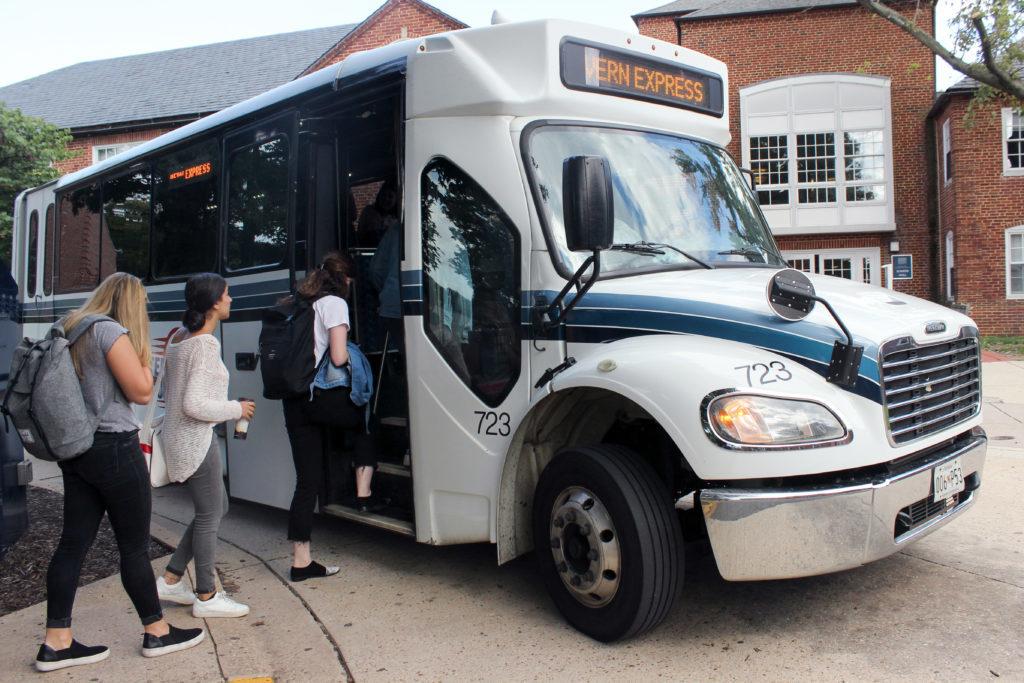The University’s transportation department wants to know if the Vern Express is delayed or if drivers are running red lights – and it’s sending in students to find out.
The “secret shoppers” program, which was piloted in spring 2016, is entering its second official semester and recruiting 10 to 15 students within the next two weeks to ride the Vex and report their experiences. Students who lived on the Mount Vernon Campus last academic year said the program was a way to bring officials’ attention to everyday problems with the Vex, but officials wouldn’t say if the feedback led to any changes.
University spokesman Brett Zongker said the initiative was piloted last academic year to give students an opportunity to share their Vex experiences directly with the Division of Operations, which oversees the service.
“The purpose of these ‘shoppers’ is to spot check the Vex service, paying specific attention to commitments that GW’s Transportation services team makes to its riders, including if signage is visible, cleanliness, visibility of contact information inside of shuttle and easy access to a supervisor on site,” he said in an email.
Students participating in the program document six Vex rides, two rides after hours, two on the weekends and two during “peak weekday ridership,” Zongker said.
Zongker declined to say how many students participated last year and if any of the feedback given through the program has been used to make changes to the Vex.
Gabe Galvez, a student employee in the transportation department who participated in the program last academic year, said he chronicled unpleasant experiences with Vex staff and unpredictable shuttle schedules.
“I was tired of feeling like I was either going to die to try to get to class or just never make it to class,” he said. “It was tough just trying to make a commute that should have been pretty easy, but was really difficult and inaccessible for students.”
After each trip, the students fill out a Google survey form about their experience and highlight alarming or potentially harmful experiences, Galvez said.
The Vex is supposed to depart from both campuses every five minutes on weekdays – and less frequently on nights and weekends – but Galvez said shuttles are often delayed and students are stuck waiting at stations. He said there is a “lack of communication” between drivers and passengers because there are often similar-looking shuttles headed to different campuses and inconsistent running schedules.
“I’ve had people who think they’re on the Vex that actually end up going to the Virginia campus, and that’s a big problem because then they’re like two hours away when they really should be on the Vern,” Galvez said.
He said the transportation department is looking mostly to recruit students taking classes or living on the Vern to participate in the program because those students frequently ride the Vex and interact with drivers. Last spring, students living on the Vern received emails from their RAs advertising the program.
Riders who are selected by the department are awarded a pair of movie tickets after six responses, but they can continue providing feedback throughout the academic year. They are also not required to submit a report unless they feel something should be acknowledged, Galvez said.
“We all want to make the Vex a more effective, more efficient service for students, no matter who you are,” he said.
Galvez said that since he became involved with the secret shoppers program, he has noticed more supervisors stationed at each pick-up and drop-off area on the Vern and in front of Funger Hall to answer student questions. But he said he is unsure if the program influenced that change.
Noelle Purcell, a sophomore who participated in the project last year, said she filled out between 20 to 30 surveys documenting if station signs had the correct information about the driver name and contact information, how long the ride took, the cleanliness of the bus and the driver’s attitude.
Purcell said she did not think her reviews helped make positive change on the Vex.
“I didn’t see an increase in signs, which was the biggest problem that I noted,” she said. “Drivers usually left on time and were always welcoming.”
Freshmen and Vern resident Daniel Di Camillo said he applied to the program this year because he has already identified issues with the shuttle service, like the fact that some bus seats are stuck in the reclined position, which makes them difficult to use.
“The biggest problems I have noticed are overcrowding of the shuttle and in some cases, riders being left to take the next shuttle, which may not arrive for 15 or 30 minutes,” Di Camillo said.





